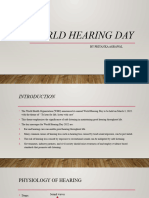Hearing Impairment
Hearing Impairment
Uploaded by
caiontaCopyright:
Available Formats
Hearing Impairment
Hearing Impairment
Uploaded by
caiontaOriginal Title
Copyright
Available Formats
Share this document
Did you find this document useful?
Is this content inappropriate?
Copyright:
Available Formats
Hearing Impairment
Hearing Impairment
Uploaded by
caiontaCopyright:
Available Formats
Hearing impairment
Hearing impairment in developing countries
The World Health Organisation estimates that a staggering 50% of hearing impairment
can be prevented.
Hearing impairment can have a disastrous impact on the development of effective
speech, communication, learning and social integration. Appropriate intervention is
essential for children to have a chance in life. Without auditory rehabilitation, hearing
impaired and deaf children in developing countries are routinely abandoned.
In developing countries, millions of hearing impaired children do not have hearing aids or
rehabilitation support. In contrast, Australian children with hearing loss receive
complete rehabilitation support including free hearing aids.
In developing countries there is a huge need for audiology services. In 1995 the World
Health Organisation estimated that there were at least 120 million people in the world
with a disabling hearing impairment of which 78 million were in developing countries.
This report also showed that in the South-East Asia, 25 million people were estimated to
have a disabling hearing impairment, of which approximately 2.5 million were children
aged under 18 years.
Hearing services in developing countries
The burden of deafness and hearing impairment is estimated to be almost twice as large
in developing countries as available services are almost non-existent.
In most developing countries, audiology has been established as a profession, however,
clinical services often only serve small areas, and government funding for hearing
services is limited. The lack of epidemiological research on the extent of hearing
impairment makes it difficult to develop strategies and programs on a national level.
Audiology services understandably become a lower priority for countries which are
struggling to provide the basic requirements of health in order to avoid life threatening
consequences. The result is that in most developing countries audiology services are
inaccessible to a large portion of the population. This gap can only be filled by
audiologists volunteering their services to these countries. <link>
Barriers to establishing hearing services
Cultural views of hearing impairment and disability will affect the importance the
community and government place on treatment and rehabilitation programs. Attitudes
toward deafness and hearing impairment are influenced by the socio-economic
conditions, lack of understanding about the nature of the disability and beliefs about the
origin of the disability.
Other contributing factors include political barriers, lack of trained personnel, inadequate
health education, insufficient research on communication disorders in developing
countries, and a lack of local and culturally valid assessment procedures.
You might also like
- Alexander McQueen and The Neo-Victorian Femme FataleDocument17 pagesAlexander McQueen and The Neo-Victorian Femme Fataleandi80s100% (1)
- Final Adpie Paper FinalDocument20 pagesFinal Adpie Paper Finalapi-409929495No ratings yet
- Mayo Clinic on Better Hearing and Balance: Strategies to Restore Hearing, Manage Dizziness and Much MoreFrom EverandMayo Clinic on Better Hearing and Balance: Strategies to Restore Hearing, Manage Dizziness and Much MoreNo ratings yet
- Medical-Surgical Nursing Assessment and Management of Clinical Problems 9e Chapter 66Document15 pagesMedical-Surgical Nursing Assessment and Management of Clinical Problems 9e Chapter 66sarasjunkNo ratings yet
- Accessibility of Healthcare Among Poor Women and Their Children in Coastal Communities 1Document30 pagesAccessibility of Healthcare Among Poor Women and Their Children in Coastal Communities 1ajdgafjsdga100% (1)
- Key Facts: Congenital CausesDocument3 pagesKey Facts: Congenital CausesStar DustNo ratings yet
- Advocacy HIDocument2 pagesAdvocacy HIJamesAnthonyNo ratings yet
- Swanepoel Telehealth (2010) PDFDocument24 pagesSwanepoel Telehealth (2010) PDFRoberta VianaNo ratings yet
- Key Facts: Hearing Loss and DeafnessDocument5 pagesKey Facts: Hearing Loss and DeafnessrahmaNo ratings yet
- A Holistic ApproachDocument13 pagesA Holistic ApproachsepthyaniNo ratings yet
- Factors Influencing Health and HDDocument22 pagesFactors Influencing Health and HDapi-311270394No ratings yet
- During Her Time HereDocument79 pagesDuring Her Time HereJesslyn SetiawanNo ratings yet
- Jurnal OmskDocument13 pagesJurnal OmskIntan Nur HijrinaNo ratings yet
- Pérdida Auditiva y Uso de Los Servicios de Salud Un Estudio Transversal de Base Poblacional Entre Adultos Mayores FinlandesesDocument11 pagesPérdida Auditiva y Uso de Los Servicios de Salud Un Estudio Transversal de Base Poblacional Entre Adultos Mayores FinlandesesMARTIN NICOLAS MORA STAGNONo ratings yet
- 2014 Chung Et Al HearingReportChina AudiologyToday2014Document12 pages2014 Chung Et Al HearingReportChina AudiologyToday2014Farhana AnuarNo ratings yet
- How The Lack of Access To Health Care Affects Least Developing Countries and Their Societies - Senior Project Paper FinalDocument16 pagesHow The Lack of Access To Health Care Affects Least Developing Countries and Their Societies - Senior Project Paper Finalapi-357817025No ratings yet
- 9 National Deafness Sector Summit: Australian Hearing Hub Sydney. Saturday 7 May 2016Document6 pages9 National Deafness Sector Summit: Australian Hearing Hub Sydney. Saturday 7 May 2016Winnie BridieNo ratings yet
- 10 Facts On DisabilityDocument3 pages10 Facts On DisabilityCare InvalidsNo ratings yet
- Ijerph 17 06209Document14 pagesIjerph 17 06209koNo ratings yet
- Ii. Problems and Development Strategies: Problems of The Third World CountriesDocument21 pagesIi. Problems and Development Strategies: Problems of The Third World CountriesMicsjadeCastilloNo ratings yet
- First Regular Session: Fifteenth Congress of The Republic) of The PhilippinesDocument5 pagesFirst Regular Session: Fifteenth Congress of The Republic) of The PhilippinesVERA FilesNo ratings yet
- Identifying Disability Issues Related To Poverty ReductionDocument67 pagesIdentifying Disability Issues Related To Poverty ReductionVERA Files0% (1)
- Disability: Report by The SecretariatDocument7 pagesDisability: Report by The SecretariatLuciano Nery FerreiraNo ratings yet
- 1.concepts and Principles of Preventive Dentistry PDFDocument59 pages1.concepts and Principles of Preventive Dentistry PDFCarolinePiske67% (6)
- Manual Untuk Trainer-Intermediate Level-Pelatihan Tenaga Kesehatan Telinga Dan PendengaranDocument124 pagesManual Untuk Trainer-Intermediate Level-Pelatihan Tenaga Kesehatan Telinga Dan PendengaranpriagunghayundoroNo ratings yet
- Dental Public Health! A Mistaken Identity: Singh Abhinav, Purohit M BharathiDocument4 pagesDental Public Health! A Mistaken Identity: Singh Abhinav, Purohit M BharathichsuchitraNo ratings yet
- Otitis MediaDocument18 pagesOtitis Mediaapi-284314498No ratings yet
- CBTP ResearchDocument35 pagesCBTP ResearchElsaye WCUNo ratings yet
- State of DecayDocument8 pagesState of DecayWisdomToothOHANo ratings yet
- Hearing Services Program and The National Disability Insurance SchemeDocument12 pagesHearing Services Program and The National Disability Insurance SchemeWinnie BridieNo ratings yet
- Statistics PWDs PHDocument5 pagesStatistics PWDs PHStephen TrinidadNo ratings yet
- Source: UNAIDS Global Summary 2006 Source: Stop Aids Now Source: Website Stop Aids Now: - UnaidsDocument8 pagesSource: UNAIDS Global Summary 2006 Source: Stop Aids Now Source: Website Stop Aids Now: - UnaidsChindy Sagita PNo ratings yet
- Disability in SomaliaDocument22 pagesDisability in SomaliaSamira HassanNo ratings yet
- 08 - Geriatric Dentistry A ReviewDocument4 pages08 - Geriatric Dentistry A ReviewbkprosthoNo ratings yet
- SJ BDJ 2008 850Document13 pagesSJ BDJ 2008 850Mostafa FayadNo ratings yet
- Hearing and Speech ImpairmentDocument2 pagesHearing and Speech ImpairmentDanloyd QuijanoNo ratings yet
- Definition of The Elderly PopulationDocument8 pagesDefinition of The Elderly PopulationDinda Prastika SariNo ratings yet
- National Oral Health PolicyDocument8 pagesNational Oral Health Policykrishna sigdelNo ratings yet
- Complementary and Integrative Health Care Management of Dementia Among The Elderly in CaviteDocument13 pagesComplementary and Integrative Health Care Management of Dementia Among The Elderly in Caviteperez100% (1)
- 205 2009 6 9 11 37 AmDocument114 pages205 2009 6 9 11 37 Amapi-231856150No ratings yet
- ProjectDocument2 pagesProjectTrần Lê Uyên PhươngNo ratings yet
- Indigenous Health in AustraliaDocument4 pagesIndigenous Health in AustraliaKerryann HuntNo ratings yet
- 6.21 Hearing Loss: BackgroundDocument3 pages6.21 Hearing Loss: BackgroundRonald Ivan WijayaNo ratings yet
- Early Detection and Intervention in Audiology: An African perspectiveFrom EverandEarly Detection and Intervention in Audiology: An African perspectiveKatijah Khoza-ShangaseNo ratings yet
- Mini ResearchDocument7 pagesMini ResearchjeromeNo ratings yet
- whd2016 Brochure en 2Document16 pageswhd2016 Brochure en 2api-311125682No ratings yet
- Philippine Cerebral PalsyDocument6 pagesPhilippine Cerebral PalsyRon DoguilesNo ratings yet
- Translated ArticleDocument4 pagesTranslated Articledhea alifa zahroNo ratings yet
- Social Determinants and Interventions For Health The Deaf PopulationDocument30 pagesSocial Determinants and Interventions For Health The Deaf PopulationAselin WengNo ratings yet
- Adpi Paper Final UpdatedDocument16 pagesAdpi Paper Final Updatedapi-409808326No ratings yet
- Operational Guidelines Ear, Nose and Throat (ENT) Care at HWCsDocument32 pagesOperational Guidelines Ear, Nose and Throat (ENT) Care at HWCsAnagha M NairNo ratings yet
- HSC 430 Childhood Disease PaperDocument10 pagesHSC 430 Childhood Disease Paperapi-502687231No ratings yet
- Vital 518Document3 pagesVital 518Rashmita NayakNo ratings yet
- Equal Access To Healthcare: The Importance of Accessible Healthcare Services For People Who Are DeafblindDocument38 pagesEqual Access To Healthcare: The Importance of Accessible Healthcare Services For People Who Are DeafblindErn NievaNo ratings yet
- 05 O Ajay BhambalDocument6 pages05 O Ajay BhambalNabila RizkikaNo ratings yet
- World Hearing DayDocument27 pagesWorld Hearing DayPomy AgrawalNo ratings yet
- The Blurred RealityDocument1 pageThe Blurred RealityJonell RazoNo ratings yet
- Meeting Deaf Patients Communication NeedsDocument4 pagesMeeting Deaf Patients Communication NeedsLuisMunozD'SantosNo ratings yet
- "We Care For You": Sensitizing Youth Towards Differently AbledDocument13 pages"We Care For You": Sensitizing Youth Towards Differently AbledNamrata GuptaNo ratings yet
- Final Adpie Paper WeeblyDocument20 pagesFinal Adpie Paper Weeblyapi-410404753No ratings yet
- Oral Health Disparities Among The Elderly: Interdisciplinary Challenges For The FutureDocument10 pagesOral Health Disparities Among The Elderly: Interdisciplinary Challenges For The FutureJASPREETKAUR0410No ratings yet
- Guidelines AconselhamentoDocument28 pagesGuidelines Aconselhamentoraquelgsilva17No ratings yet
- Healing Across Cultures: Pathways to Indigenius Health EquityFrom EverandHealing Across Cultures: Pathways to Indigenius Health EquityNo ratings yet
- Oet With Tincy Listening Set-1Document279 pagesOet With Tincy Listening Set-1ssunithasanuNo ratings yet
- Oral Lesions and HomoeopathyDocument27 pagesOral Lesions and HomoeopathyDr. Rajneesh Kumar Sharma MD HomNo ratings yet
- Final Plant Diversity Lab ReportDocument6 pagesFinal Plant Diversity Lab Reportapi-508660724No ratings yet
- Obturatia BuchananDocument5 pagesObturatia BuchananAndra ClejaNo ratings yet
- Forensic Medicine - Glossary of TermsDocument9 pagesForensic Medicine - Glossary of TermsJudilyn RavilasNo ratings yet
- Ancient India'S Contribution To Mathematics: A.P. GuptaDocument70 pagesAncient India'S Contribution To Mathematics: A.P. GuptaChandra Bhal SinghNo ratings yet
- Food IntoxicationDocument34 pagesFood IntoxicationMuqtadir “The Ruler” KuchikiNo ratings yet
- Yohimbe Bark Extract (Burantashi) in Male: Sub-Acute Hepatotoxicity of Pausinystalia Albino Rats (Rattus Novergicus)Document8 pagesYohimbe Bark Extract (Burantashi) in Male: Sub-Acute Hepatotoxicity of Pausinystalia Albino Rats (Rattus Novergicus)iyke obidikeNo ratings yet
- Medicolegal Aspects of DeathDocument1 pageMedicolegal Aspects of DeathGurdeep KaurNo ratings yet
- Bsms Sylabus by CCIMDocument20 pagesBsms Sylabus by CCIMarulsidd74No ratings yet
- Overview of Respiratory Failure & Use of Mechanical VentilationDocument89 pagesOverview of Respiratory Failure & Use of Mechanical VentilationsheharyarNo ratings yet
- Aorta Replacement and Repair Thoracic Aortic DissectionDocument3 pagesAorta Replacement and Repair Thoracic Aortic DissectionprofarmahNo ratings yet
- Cold Weather Safety Tips.Document2 pagesCold Weather Safety Tips.jgstorandt44No ratings yet
- Oral Care: By: Aubrey A. Dayrit, MA, RNDocument25 pagesOral Care: By: Aubrey A. Dayrit, MA, RNAlthea Gabriel CastrosantoNo ratings yet
- Phonocardiography (PCG) : Presented By:-Group 3 Kushaggra Sharma: 2016UIC3157 Abhinav Gupta: 2016UIC3175Document13 pagesPhonocardiography (PCG) : Presented By:-Group 3 Kushaggra Sharma: 2016UIC3157 Abhinav Gupta: 2016UIC3175ABHINAV GUPTANo ratings yet
- Castillo, Kristofer Karlo C.: ObjectiveDocument2 pagesCastillo, Kristofer Karlo C.: ObjectiveJan Karlo CastilloNo ratings yet
- Heart Failure BrochureDocument2 pagesHeart Failure Brochureapi-251155476No ratings yet
- 2.health AssessmentDocument7 pages2.health Assessment2BGrp3Plaza, Anna MaeNo ratings yet
- Jiang Et Al-2023Document14 pagesJiang Et Al-2023Livia Do CarmoNo ratings yet
- Announcement Grand Round 2022Document8 pagesAnnouncement Grand Round 2022Alqodri SetiawanNo ratings yet
- MAU DE THI THU DAI HOC Ä Á 002Document6 pagesMAU DE THI THU DAI HOC Ä Á 002Nguyễn VânAnhNo ratings yet
- Instant Download Oxford Textbook of Psychopathology (Oxford Library of Psychology) 4th Edition Robert F. Krueger (Editor) PDF All ChapterDocument64 pagesInstant Download Oxford Textbook of Psychopathology (Oxford Library of Psychology) 4th Edition Robert F. Krueger (Editor) PDF All Chapterresernjange9100% (4)
- Histamine, Serotonin and Ergot AlkaloidsDocument36 pagesHistamine, Serotonin and Ergot AlkaloidsSteph Taylor Reyes Radan100% (3)
- BulushiDocument9 pagesBulushiMatheus HenriqueNo ratings yet
- (Medicalstudyzone - Com) NBME 25 Answers VersionDocument200 pages(Medicalstudyzone - Com) NBME 25 Answers VersionMahnoor Tauqeer100% (1)
- Symmetry of Skin TemperatureDocument4 pagesSymmetry of Skin TemperaturepenfoNo ratings yet
- Covasc Tablet 5mg 211222Document1 pageCovasc Tablet 5mg 211222ariff-azuanNo ratings yet

























































































